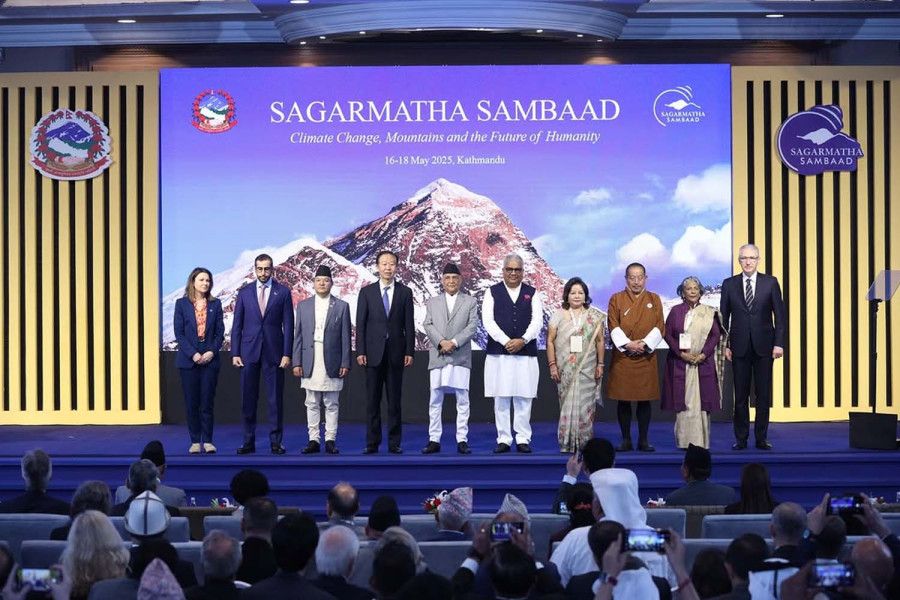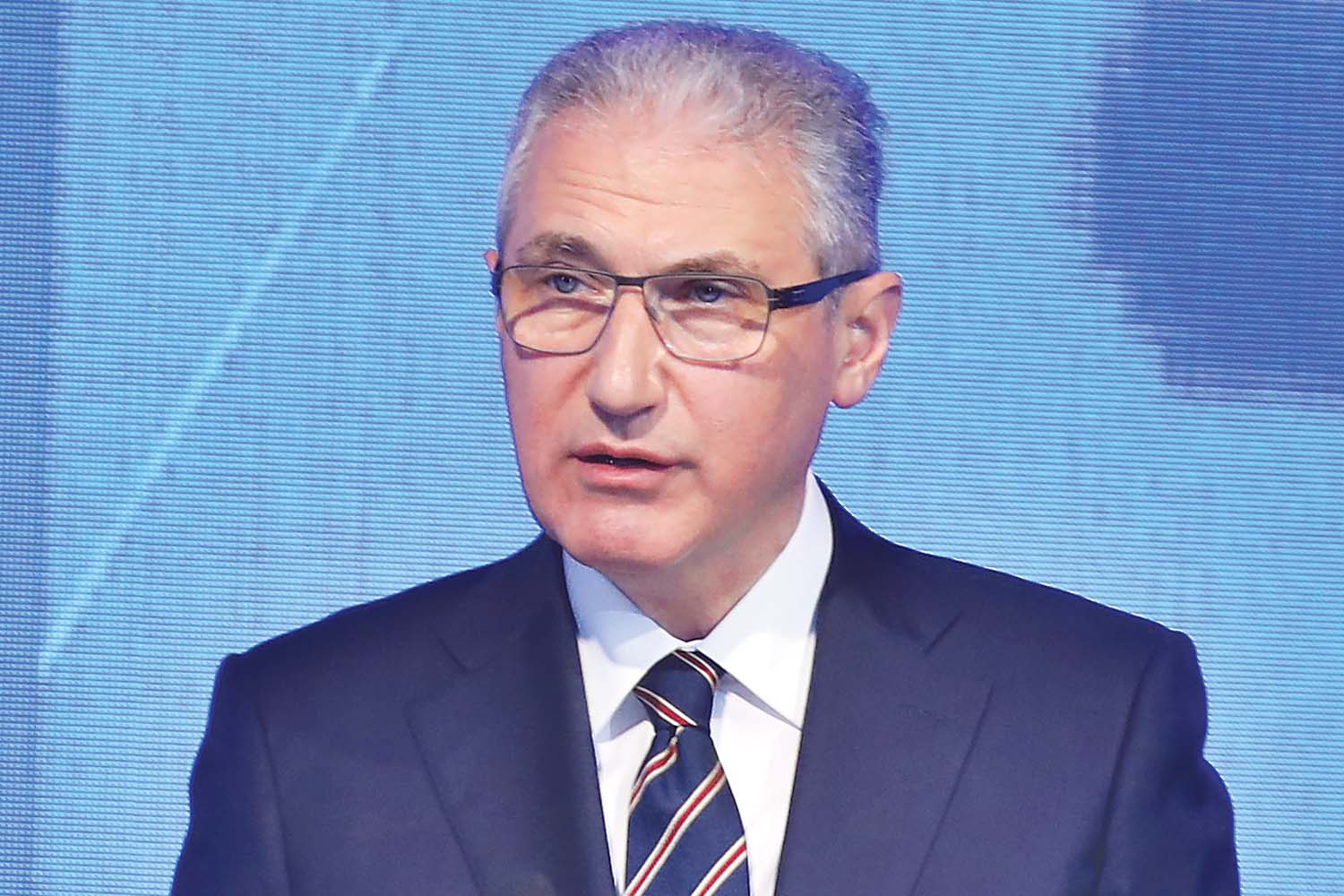National
Sagarmatha Sambaad opens with global call for climate action
Experts urge governments to share data, trust science, and boost climate financing to save the planet.
Anil Giri
Leaders and climate experts from around the world gathered in Kathmandu on Friday for the Sagarmatha Sambaad and began deliberating on pressing climate change issues.
The Sambaad brings together experts from diverse backgrounds with expertise in science, environment, climate change and policymaking at one venue for three days to discuss the challenges facing mountainous countries, including strengthening institutional mechanisms, data sharing among affected nations, and, most importantly, placing trust in science to tackle the climate crisis.
Prime Minister KP Sharma Oli inaugurated the three-day event, which is being attended by over 360 foreign and local representatives.
Speaking from the lap of Sagarmatha, the world’s highest peak, Oli said in his inaugural speech: “We send this message—loud and clear—to protect the mountains is to protect the planet. To protect the mountains is to protect our seas. To protect the mountains is to protect humanity itself. Let this Sambaad be not just a dialogue—but a determination. A determination to listen, to act, and to walk together—towards a gentler, wiser, and more compassionate world.”
Before addressing the opening session, Oli officially unveiled the government's Nationally Determined Contribution (third NDC) and handed it over to Mukhtar Babayev, the president of COP-29.
The NDC is Nepal’s commitment under the Paris Agreement adopted at COP-21 of the United Nations Framework Convention on Climate Change.
United Nations Secretary General Antonio Guterres sent a video message which was showcased during the inaugural session, alongside addresses from leaders and officials including from India, China, and other countries and institutions.
In his address, the prime minister emphasised the urgency of protecting melting mountains to ensure mankind’s survival.
“Can humanity survive without its mountains? Can we protect the future without protecting these ancient guardians? Mountains may seem far away. But their breath keeps half the world alive. From the Arctic to the Andes, from the Alps to the Himalayas—They are the Earth’s water towers. They are our climate’s pulse. And they are in danger. Their fragility is our shared vulnerability,” said Oli.
After the inaugural session, Foreign Minister Arzu Rana Deuba chaired a plenary session where representatives and leaders from various countries shed lights on the importance of local climate financing, water replenishment, mitigation, adaptation, and connecting agriculture with adaptation strategy, among other issues.
“As conscientious custodians of our rivers, forests and mountains, we contribute more than our due share to the health of the planet,” said Rana. “However, we are forced to face a heavy and disproportionate burden of the negative impacts of climate change.”
“The absence of honest dialogue and impactful action not only heightens the risk on the environment—in Nepal and elsewhere—but also puts the future of humanity itself at great peril,” she said. “This is grave injustice and must be addressed promptly lest it become too late.”

Over the next three days, we will ask ourselves how best to tackle the existential threat of climate crisis, restore the health of the planet and ensure the wellbeing of the people who live in it,” she added.
Speaking in a parallel session, Pam Pearson, director of the International Cryosphere Climate Initiative (ICCI), emphasised the role of science to lessen the impact of climate change and called on mountainous countries to come together in order to build their case.
Aparna Shukla, scientist at the Ministry of Earth Science, India emphasised institutional reforms, better data sharing and other collaboration among the countries.
Almost all speakers who spoke in the parallel session on “Urgency of 1.5-degree ambition for the preservation of glaciers” called for rapid decarbonisation and debated how to limit temperature rise beyond 1.5 degrees.
The Intergovernmental Panel on Climate Change (IPCC) has published a special report on the impacts of global warming of 1.5°C above pre-industrial levels. The report outlines global greenhouse gas emission pathways and emphasises the need for strengthening global response to climate change, promoting sustainable development, and supporting efforts to eradicate poverty.
A representative from IPCC said that the body is ready to support vulnerable countries and asked the participants to follow the IPCC for the latest findings on climate issues.
“Nevertheless, the cascading impacts of global warming and climate change far exceed our capacity and resources to mitigate them,” said Minister Deuba. “We call for predictable and adequate climate finance as we require greater resources to implement our national and local adaptation plans.”
“Climate change is a global crisis transcending national boundaries. Nothing less than a global alliance based on justice and solidarity can hope to make a dent on the existential crisis that climate change brings in its wake. Thus, we call for a sufficient and effective loss and damage fund that can be easily accessed by countries in crisis,” she added.
Minister for Forests and Environment Ain Bahadur Shahi Thakuri shared some facts and figures during the inaugural session. In 2023, Nepal’s per capita CO₂ emissions stood at just 0.57 tons, far below the global average of 6.76 tons, said Thakuri. “Our forests, covering nearly 46 percent of the country, act as vital carbon sinks and biodiversity havens.”
“Even in the face of daunting challenges, Nepal remains resolute in its climate leadership. We have embraced a justice-centered approach, embedding climate action into national planning. Our enhanced Nationally Determined Contribution [NDCs] is dedicated to achieving net-zero emissions by 2045—five years ahead of the global target.”
“Our National Climate Change Policy and National Adaptation Plan provide clear roadmaps to resilience, with sectoral strategies targeting agriculture, energy, water, infrastructure, and biodiversity,” he said.
Both the prime minister and foreign minister held separate talks with ministers, officials and leaders from abroad who are participating in Sagarmatha Sambaad.




 21.12°C Kathmandu
21.12°C Kathmandu














